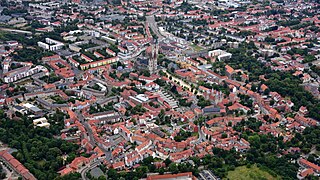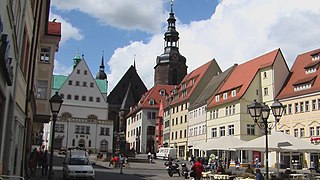See also
- Mechthild of Magdeburg (c. 1207–c. 1282/1294), a medieval mystic
- Adalbert of Magdeburg, a canonised German monk
Magdeburg is the capital city of Saxony-Anhalt, Germany.
Magdeburg may also refer to:
Places:
Ships:
Other uses:

Magdeburg is the capital and second-largest city of the German state of Saxony-Anhalt, after Halle (Saale). It is situated on the Elbe River.

Saxony-Anhalt is a state of Germany, bordering the states of Brandenburg, Saxony, Thuringia and Lower Saxony. It covers an area of 20,447.7 square kilometres (7,894.9 sq mi) and has a population of 2.19 million inhabitants, making it the 8th-largest state in Germany by area and the 11th-largest by population. Its capital is Magdeburg and its largest city is Halle (Saale).

Adalbert of Magdeburg, sometimes incorrectly shortened to "Albert", known as the Apostle of the Slavs, was the first Archbishop of Magdeburg and a successful missionary to the Polabian Slavs to the east of what is contemporarily Germany. He was later canonised and his liturgical feast day was assigned as 20 June.
Königsberg was the capital of East Prussia, renamed Kaliningrad in 1946.

The Altmark is a historic region in Germany, comprising the northern third of Saxony-Anhalt. As the initial territory of the March of Brandenburg, it is sometimes referred to as the "Cradle of Prussia", as by Otto von Bismarck, a native from Schönhausen near Stendal.

The history of Saxony-Anhalt began with Old Saxony, which was conquered by Charlemagne in 804 and transformed into the Duchy of Saxony within the Carolingian Empire. Saxony went on to become one of the so-called stem duchies of the German Kingdom and subsequently the Holy Roman Empire which formed out of the eastern partition of the Carolingian Empire. The duchy grew to become a powerful state within the empire, ruling over much of what is now northern Germany, but following conflicts with the emperor it was partitioned into numerous minor states around the end of the 12th century.

Magdeburg was one of the three Regierungsbezirke of Saxony-Anhalt, Germany, located in the north of the country.

The Archbishopric of Magdeburg was a Roman Catholic archdiocese (969–1552) and Prince-Archbishopric (1180–1680) of the Holy Roman Empire centered on the city of Magdeburg on the Elbe River.

The Province of Saxony, also known as Prussian Saxony was a province of the Kingdom of Prussia and later the Free State of Prussia from 1816 until 1944. Its capital was Magdeburg.

Wettin is a small town belonging to the municipality of Wettin-Löbejün in the Saale District of Saxony-Anhalt (Saxony-Ascania), Germany. It is situated on the River Saale, just north of Halle. It is known for Wettin Castle, the ancestral seat of the House of Wettin, the former ruling dynasty of Saxony, Poland, the United Kingdom, Belgium, and Bulgaria. The town and its name are of Slavic origin.

Halberstadt is a town in the German state of Saxony-Anhalt, the capital of Harz district. Located north of the Harz mountain range, it is known for its old town center that was greatly destroyed by Allied bombings in late stages of World War II after local Nazi leaders refused to surrender. The town was rebuilt in the following decades.

Eisleben is a town in Saxony-Anhalt, Germany. It is famous as both the hometown of the influential theologian Martin Luther and the place where he died; hence, its official name is Lutherstadt Eisleben. First mentioned in the late 10th century, Eisleben is divided into old and new towns, the latter of which was created for Eisleben's miners in the 14th century. As of 2020, Eisleben had a population of 22,668. It lies on the Halle–Kassel railway.

The Duchy of Magdeburg was a province of the Margraviate of Brandenburg from 1680 to 1701 and a province of the German Kingdom of Prussia from 1701 to 1807. It replaced the Archbishopric of Magdeburg after its secularization by Brandenburg, giving to the Elector another influent seat to the Reichstag’s College of Princes. The duchy's capitals were Magdeburg and Halle, while Burg was another important town. Dissolved during the Napoleonic Wars in 1807, its territory was made part of the Province of Saxony in 1815.

The Diocese of Magdeburg is a diocese of the Latin Church of the Catholic Church, located in the German state of Saxony-Anhalt. Its seat is Magdeburg; it is suffragan to the Archdiocese of Paderborn.
Central Germany is an economic and cultural region in Germany. Its exact borders depend on context, but it is often defined as being a region within the federal states of Saxony, Thuringia and Saxony-Anhalt, or a smaller part of this region, such as the metropolitan area of Leipzig and Halle plus the surrounding counties.

Jerichow is a town on the east side of the river Elbe, in the District of Jerichower Land, of the state of Saxony-Anhalt in Germany. With about 270 square kilometres (100 sq mi), the municipality of Jerichow is one of the largest municipalities in area size in Germany.
Saxony is a historical region in Germany and a federal state.

Diesdorf is a municipality (Flecken) in the district Altmarkkreis Salzwedel, in Saxony-Anhalt, Germany.
Gödnitz is a village and a former municipality in the district of Anhalt-Bitterfeld, in Saxony-Anhalt, Germany. Since 1 January 2010, it is part of the town Zerbst/Anhalt.

The Province of Magdeburg was a province of the Free State of Prussia within Nazi Germany from 1944 to 1945. The provincial capital was Magdeburg.